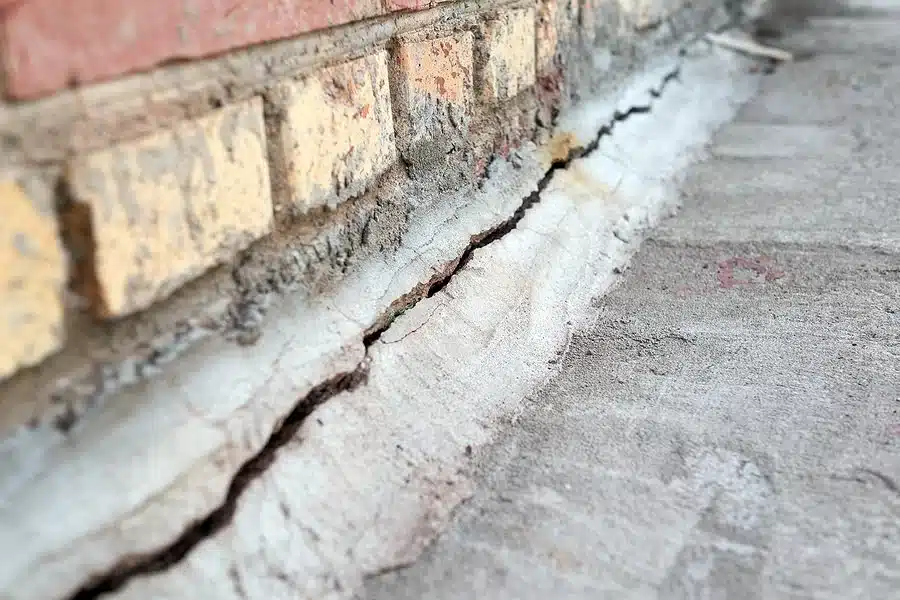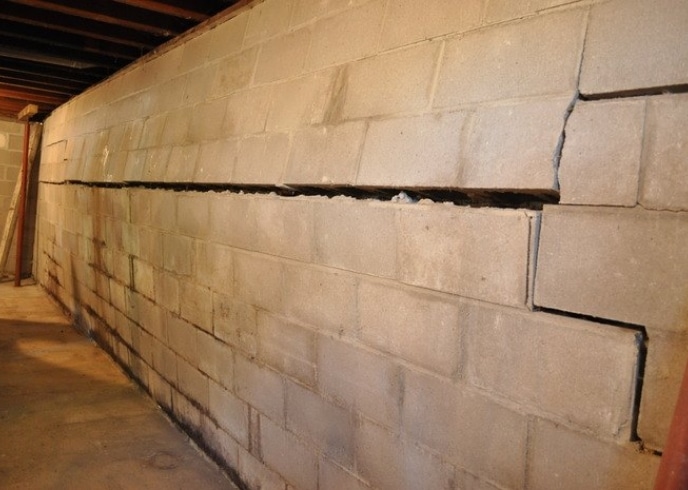Cracked Foundation? Let Us Restore Your Homes Stability
Have you noticed cracks in your home’s foundation? It’s more than just an eyesore; it’s a red flag indicating your home’s stability is at risk. You’re probably wondering what the implications are, what causes it, and how it can be fixed. We’re here to help you navigate these questions, providing professional insight and practical solutions to restore your home’s structural integrity. Curious about what this entails? Stay tuned.
Key Takeaways
- Regular inspections and timely foundation repairs prevent structural damage and escalating repair costs.
- Professional assessment aids in accurately detecting hidden foundation issues and provides appropriate solutions.
- Implementing proper drainage systems and soil compaction techniques enhances foundation stability.
- Using foundation underpinning helps stabilize and support structures, restoring home stability.
- Proactive maintenance, such as landscaping and gutter cleaning, diverts water from the foundation, preventing future problems.
Understanding Foundation Cracks
Cracks in your foundation can be more than just an eyesore; they can seriously threaten your home’s stability. You might be wondering, what causes these cracks? Pressure is the main culprit. When the soil around your house expands and contracts due to changes in moisture levels, it can exert pressure on the foundation. Over time, this pressure can lead to cracks.
Moreover, the type of soil your home is built on can also play a role. Clay soils, for instance, expand considerably when wet, leading to larger, more damaging cracks. On the other hand, sandy soils tend not to hold water, meaning less pressure is placed on the foundation.
However, it’s important to remember that not all cracks indicate a problem with your foundation’s stability. Small hairline cracks are often just cosmetic and can be easily repaired. But more significantly, horizontal cracks could mean serious trouble.
Understanding these causes can help you prevent foundation cracks in the future. But if you’re already noticing cracks, don’t panic. There are ways to fix them, which we’ll explore in the next section.
Signs of a Damaged Foundation
You might be living with a damaged foundation and not even know it.
Pay close attention to identifying cracks and fractures, uneven floors and walls, and misaligning doors and windows.

These signs can indicate a serious foundation issue that needs your immediate attention.
Identifying Cracks and Fractures
Spotting the signs of a damaged foundation early on can save you considerable time, money, and stress. Let’s explore how you can identify cracks and fractures, the tell-tale signs of foundation damage.
One way to identify cracks is by their shape. Horizontal cracks typically indicate severe pressure or soil erosion, while diagonal ones suggest differential settling. Vertical cracks, though less severe, shouldn’t be ignored.
Here’s a handy table to help you identify and understand these cracks better:
| Crack Type | Indication | Action Required |
|---|---|---|
| Horizontal | Severe pressure or soil erosion | Immediate professional attention |
| Diagonal | Differential settling | Professional assessment |
| Vertical | Minor settling | Monitor, but consult a professional if it expands |
Uneven Floors and Walls
While cracks in your foundation may be the most obvious signs of damage, don’t overlook the subtler indication of uneven floors and walls.
It isn’t just about aesthetics or tripping over an uneven surface. This could be a telling sign that your home’s foundation is compromised.
When your floors slope, or your walls start to bow, it indicates foundational shifting.
You might notice some furniture leaning, or perhaps you’ve spilled a drink because your table isn’t level.
Don’t brush it off. These are signs that your foundation is crying out for help.
It’s vital to address these issues promptly.
Ignoring them doesn’t make them disappear.
These signs can worsen over time, leading to more significant damage and costlier repairs when left untreated.
Doors and Windows Misalignment
Over time, misaligned doors and windows might become an annoying daily inconvenience.
You’ll likely notice doors that won’t close properly or windows that seem to stick.
But did you know these issues could be more than a minor annoyance? They may be signs of a damaged foundation.
When your home’s foundation shifts, it can cause the frames of your doors and windows to become skewed.
This misalignment isn’t just a cosmetic issue. It’s a warning sign that your home’s integrity might be compromised.
Don’t ignore these signs.
If you struggle to open or close your doors and windows, it’s time to take action.
A professional can assess whether your home’s foundation is the cause and provide solutions to restore stability.
Impact of a Cracked Foundation
Even though you may not realize it, a cracked foundation can considerably affect your home’s overall stability.
Let’s look at the impact of a cracked foundation. You might start noticing uneven floors, which aren’t just an eyesore and a potential trip hazard. The walls of your home might start to bow or bulge, and you may also see cracks appearing in them. These are signs that your home’s structural integrity is compromised.
Beyond the aesthetic issues, a cracked foundation can lead to moisture intrusion. Water seeping into your home can cause mold growth and attract pests. This doesn’t just damage your property, but it can also lead to health issues for you and your family.
The financial impact of a cracked foundation can’t be overstated either. It can considerably decrease your home’s value.
If you’re planning to sell your home, a cracked foundation is something potential buyers will likely want addressed before they make an offer.
The Underlying Causes
Often, the causes of a cracked foundation are hidden and develop over time. You mightn’t notice the damage until it’s too late. So, what’s causing those cracks?
Poor soil conditions can be a leading culprit. If your home’s built on expansive soil that swells with moisture and shrinks when dry, it’ll pressure your foundation, causing it to crack.
Similarly, if the soil wasn’t compacted adequately before construction, it may settle over time, leading to an uneven foundation.
Drastic changes in weather and climate can also wreak havoc on your foundation. Rapid freezing and thawing cycles can cause soil to expand and contract, pushing against your foundation and creating cracks.
Then there’s the issue of improper drainage. If water’s not correctly diverted away from your house, it can accumulate around the foundation, causing the soil to expand and the foundation to crack.
Evaluating Your Home’s Stability
Now that you’re aware of the underlying causes, it’s time to assess the stability of your home.
It’s vital to recognize stability issues and understand the essentials of a home inspection.
Don’t worry; we’ll also guide you through potential solutions to restore stability to your home’s foundation.
Recognizing Stability Issues
When it comes to your home’s stability, awareness is key. Don’t wait for obvious signs of structural damage before taking action. Instead, watch for subtle signs that could indicate potential stability issues.
Remember, it’s easier, and often less expensive, to address problems early on rather than waiting until they’ve escalated.
To help you recognize stability issues, here are three things you should look out for:
- Cracks in the Walls or Foundation: While small hairline cracks can be expected, larger cracks, especially those with a width of 1/8 inch or more, may suggest a problem.
- Doors and Windows that Stick: If your doors or windows become difficult to open or close, it could be a sign of a shifting foundation.
- Uneven Floors: If you’re noticing that your floors are starting to slope or feel uneven, it might mean your home’s foundation is settling.
Don’t overlook these signs. Even if you’re unsure, getting a professional opinion is better.
Ignoring these signs can lead to more serious and expensive stability issues down the line.
Home Inspection Essentials
To maintain the stability of your home, it’s crucial to conduct regular inspections. These checks aren’t just about aesthetics or functionality but safety. A stable home keeps you and your family secure, providing the peace of mind you deserve.
First things first, inspect your home’s foundation. Look for cracks, bulges, or shifts in the structure. Don’t overlook the basement or crawl spaces. Any signs of moisture, such as mold, mildew, or water stains, could indicate a problem.
Next, check the doors and windows. It might suggest the house is shifting if they’re difficult to open or close. Additionally, examine your wall cracks. Hairline cracks are normal, but larger cracks may signal a more significant issue.
Pay attention to your floors, too. Are they uneven or sagging? If so, it’s a good idea to get a professional opinion.
Lastly, look at your home’s exterior. Do you see any leaning walls or a tilting chimney? These are potential red flags.
Potential Stability Solutions
Finding stability issues in your home can be intimidating, but don’t worry; there are potential solutions to these problems.
It’s essential to evaluate the severity of the damage and contemplate diverse remedies. Understanding the root of the problem will help you choose the right course of action.
Here are some potential stability solutions you might contemplate:
- Foundation Repair: This is often the first solution homeowners think of. It involves repairing the cracks and reinforcing the foundation. This method can be invasive and expensive but is often necessary for severe cases.
- Drainage Improvement: Sometimes, the instability is due to water damage. You can prevent further damage by improving your home’s drainage system. This could involve installing new gutters or regrading your yard to direct water away from your home.
- Soil Stabilization: If the issue is with the soil under your home, you might need to contemplate soil stabilization. This involves injecting a mixture into the ground to strengthen the soil.
Immediate Actions to Take
Cracks appearing in your home’s foundation can send anyone into panic mode. Yet, it’s essential not to let fear cloud your judgment. Here are some immediate actions you can take.
First, don’t ignore the issue. Even minor cracks can become significant problems if left untreated. Document the cracks. Take clear photos and note their locations. This will help professionals assess the situation later.
Second, limit further damage. Avoid heavy traffic or activities that may stress the foundation. If it’s safe, temporarily brace cracked areas with support beams.
Third, prepare for professional help. You’ll need to clear the area around the foundation for a thorough inspection.
Here’s a quick summary:
| Action | Purpose |
|---|---|
| Document | Help professionals assess |
| Limit Damage | Prevent cracks from worsening |
| Prepare Area | Facilitate professional inspection |
Professional Assessment: Why It’s Crucial
Often, you might be tempted to fix foundation issues on your own. You might think it’s a simple DIY job. However, evaluating and repairing a home’s foundation isn’t as straightforward as it seems. That’s where professional evaluation comes in.
- Experience and Expertise: Professionals have years of experience and the necessary expertise to conduct a thorough evaluation. They’ll identify the apparent problems and the hidden ones you might miss.
- Proper Tools and Techniques: They’ve got the right tools and techniques to do the job accurately. It’s not just about spotting cracks but understanding the whole structure.
- Prevent Future Problems: A professional evaluation can prevent problems by identifying and addressing the root cause of your foundation issues. You’ll avoid costly repairs down the line.
Our Restoration Approach
At the heart of our approach lies a commitment to restoring your home’s foundation with utmost precision and efficiency.
We recognize that your home isn’t just a building; it’s a place where memories are made, and we treat it with the respect it deserves.
Our restoration process begins with a thorough assessment of your home’s foundation.
We’ll identify the cracks, their size, and their locations. We don’t just eyeball it. We use state-of-the-art equipment to get the most accurate measurements. This allows us to develop a customized repair plan unique to your home’s needs.
Next, we’ll prepare the site for repairs.
We’ll protect your home and property from any potential damage during the restoration process.
Before starting the work, we’ll remove any debris and confirm the area is clean and safe.
Benefits of Timely Foundation Repair
You’ll find that taking timely action to repair your foundation brings several key benefits.
Not only does it prevent further structural damage, it also enhances the overall value of your property.
Plus, you’ll be sidestepping any inflated costs that could arise from future, more complex repairs.
Prevents Structural Damage
Without a doubt, preventing structural damage is one of the key benefits of timely foundation repair. A good foundation is essential to your home’s overall stability. If you ignore minor foundation issues, they can escalate into severe structural damage over time.
Don’t let your home’s safety be compromised.
- Reduces the Risk of Wall Cracks: Wall cracks aren’t just unsightly. They also indicate a deeper problem in your home’s foundation. Fixing foundation issues on time will prevent wall cracks from forming and worsening.
- Prevents Uneven Floors: You may not notice it at first, but foundation problems can cause your floors to become uneven. This doesn’t just affect the look of your home, but it can also be a safety hazard. With timely foundation repair, you’ll nip this problem in the bud.
- Avoids Plumbing Issues: You mightn’t associate plumbing with foundation, but they’re closely linked. Major foundation shifts can disrupt your plumbing lines, leading to expensive repairs. Early foundation repair can avoid this inconvenience.
Acting quickly when you spot foundation issues prevents further structural damage, saving you time, money, and stress in the long run.
Enhances Property Value
One often overlooked benefit of fixing foundation issues promptly is the added value it brings to your property. You may not realize it, but potential buyers are more likely to be attracted to a home with a sturdy, well-maintained foundation. It indicates that you’ve taken great care of your property, making it a safer, more reliable investment for them.
A sturdy foundation isn’t just about maintaining appearances either. It’s about the actual monetary value that it adds to your home. Imagine trying to sell your home only to find out that a cracked foundation has considerably dropped its market value. You wouldn’t want that, would you?
Addressing these issues immediately can prevent this from happening. When you invest in timely foundation repairs, you invest in your property’s future worth. It’s like putting money in a savings account – it grows over time.
The longer you allow your home to stand firm and unblemished, the more value it accumulates.
Avoids Future Expenses
Fixing your foundation problems as soon as they arise can save you a heap of cash. You may shy away from the initial repair cost, but it’s a small price compared to the financial burden of extensive structural damage.

Don’t let minor cracks turn into gaping holes in your wallet!
Here are three compelling reasons why timely foundation repair is a wise financial decision:
- Prevents Escalating Damage: Minor foundation issues can quickly escalate into significant structural problems. Address them promptly to avoid the higher costs of extensive repairs or a complete foundation replacement.
- Avoids Additional Repair Costs: Unresolved foundation issues can lead to other home problems like plumbing leaks, cracked walls, or uneven floors. By fixing the root cause, you’ll sidestep these additional repair bills.
- Preserve Home Value: A well-maintained foundation contributes to your home’s market value. Potential buyers often shy away from properties with foundation issues, resulting in lower offers or lost sales.
Timely repair maintains your property’s worth, securing your investment.
Ensuring Future Foundation’s Strength
Maintaining your foundation’s strength isn’t just about immediate repairs but also involves thinking ahead. It’s about taking proactive steps to guarantee your foundation remains strong and stable for years.
You can’t ignore the signs of foundation damage, like cracks in walls or doors that won’t close properly. You’ve got to address these issues promptly to prevent further damage.
But it’s equally important to take measures to stop similar problems in the future. Good drainage is key to maintaining your foundation’s strength. Ensure your gutters are clean and downspouts direct water away from your home’s foundation.
Consider investing in a foundation inspection every few years. It’s a small price to pay for peace of mind.
Also, be mindful of changes in your home’s environment. Construction nearby or changes in the landscape can affect your foundation’s strength.
Frequently Asked Questions
What Is the Average Cost of Foundation Repair?
You’re probably wondering about the cost of foundation repair. It’s not a fixed price, but you’re looking at between $5,000 to $7,000 on average. However, extensive damages can raise that to $10,000 or more.
How Long Does a Foundation Restoration Project Typically Take?
Typically, you’re looking at a few days to a week for a foundation restoration project. However, it’s contingent on the severity of the damage. More significant issues may require additional time to guarantee your home’s stability.
Does Home Insurance Usually Cover Foundation Repairs?
Typically, your home insurance doesn’t cover foundation repairs. It’s often considered regular home maintenance. But always check your specific policy. Sometimes, exceptions occur if the damage is from a covered peril.
Can Minor Foundation Cracks Be Repaired Without Professional Help?
Sure, you can fix minor foundation cracks yourself. However, it’s essential to identify the crack’s cause correctly. If it’s due to serious issues like soil pressure, you’ll need a professional’s help. Don’t risk your home’s stability.
Will a Repaired Foundation Increase the Value of My Home?
Picture your home standing tall, sturdy, and stable. A repaired foundation boosts its value and gives you peace of mind. You’re investing in your property’s safety, longevity, and a solid future.
You may think a small crack isn’t a big deal, but it could be a sign of a serious foundation issue. Don’t risk your home’s safety or value. We’ll nip the problem in the bud with our expert assessment and restoration techniques. Trust us to guarantee your foundation is strong and secure. After all, your peace of mind is worth it. Contact us today. Don’t wait until a small crack becomes a big, costly problem.
Contact the Professionals at Seal-Tite Basement Waterproofing Today! 540-992-1144

Seal-tite Basement Waterproofing Co. is a full service basement environment contractor. We carry an A+ Better Business Bureau rating. We repaired over 40,000 homes and structures in Virginia, West Virginia, Tennessee, and North Carolina. We are fully insured and licensed. We have worked in all types of locations, including residential and commercial locations, government agencies, colleges, hospitals, churches, and condo associations.
Seal-tite® offers a lifetime transferable warranty. We carry a Class A Contractor’s License and we are fully insured. Our satisfied customers range from government agencies to businesses, hospitals, colleges, churches, and thousands of homeowners. Your home is probably the single largest investment you will make in your lifetime. Don’t wait, call Seal-tite® to help make your home dry, safe and livable.

